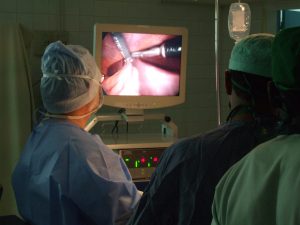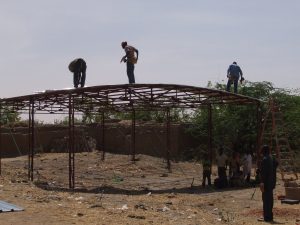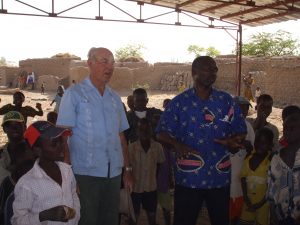 The day will be forever etched in my mind as the day an extraordinary, undeniable, miracle took place in the small village of Yalewane (yäl-uh-wän-ā), near Tillabéri in western Niger. During the rainy season, Yalewane becomes an island and is only accessible by boat. Thankfully, this was the dry season and our small team arrived at the site in a mid-sized SUV.
The day will be forever etched in my mind as the day an extraordinary, undeniable, miracle took place in the small village of Yalewane (yäl-uh-wän-ā), near Tillabéri in western Niger. During the rainy season, Yalewane becomes an island and is only accessible by boat. Thankfully, this was the dry season and our small team arrived at the site in a mid-sized SUV.
March 13, 2008 was a scorching hot day in the desert of Niger. The average March temperature is 103˚F, though our host told us it was closer to 120˚ that day. We had left the capital city of Niamey at 6:30 am in order to drive to the place where our team would help erect the skeleton of what is known as a tabernacle church. Cement footers had been poured days earlier and awaited the steel girders and trusses necessary to support the corrugated metal roof. The walls would wait until the congregation could afford to build them. The open tabernacle design would provide shade from the sun and protection from the summer rains to come.
We drove the first hour to arrive at the ferry landing, spent another hour boarding, riding, and exiting the ferry, and the final hour driving through dusty, desert roads to our destination. Less than four years earlier, our host, Brent Teague, and a small group of national workers had been ambushed on the same road by Al-Qaeda terrorists. Brent was shot in the leg with an AK-47 while driving his truck. The terrorists stopped the group, robbed them, stole the truck, and left Brent alongside the road to die. His miracle of survival is no less impressive than this story and one worth the reader’s time to investigate (click the link at the end of this story to hear the account). Brent pointed out to us the remote, hot, and dusty spot where they had been ambushed as we drove along the worn tracks in the desert. While we did not feel threatened, neither did we feel particularly safe.
Our mid-morning arrival meant temperatures were only in the lower 90’s and would give us time to acclimate to the environment. Children, youth, and unemployed young men swarmed us from every direction. Many wanted us to take their pictures or allow them to touch our white skin and western-style clothing. More timid villagers watched from behind walls and mud-brick buildings before venturing out to join us.
While part of our team got busy working on the tabernacle, the rest of us prepared to hold a free clinic under a big tree by the river. An American surgeon who had visited Niger on multiple occasions would help as many people as he could. He wasn’t there to perform surgery but to dispense simple medicines and advice for treating the host of maladies presented to him.
Dr. McGee has likely done more than any other individual in recent history to improve the delivery of quality healthcare to the impoverished, landlocked nation of Niger. Through the generous donations of hospitals, medical equipment providers, and people with a heart to help, Dr. McGee introduced laparoscopic surgery to Niger. He invited their equivalent of the US Surgeon General to Tulsa, Oklahoma in order to see him trained and certified to teach laparoscopic surgery. Because of Dr. McGee’s heart to help the people of Niger, a surgical suite was fully outfitted with modern equipment necessary to make the procedures safe and effective.
But on this day, Dr. McGee would be a general practitioner, dispensing drugs and advice from under the shade of a big tree next to the Niger River, known to be home of hundreds of hippopotamuses. At 3,000 pounds, the male hippo can run up to 30 mph and is considered one of the most dangerous animals in the world. While Dr. McGee stationed himself near the river, I chose a spot a bit further from the shoreline.
While we prepared for our first visitors at the makeshift clinic, the village chief sent word that we were not welcome. If we wanted to dig a well, he would welcome us, but building a church was not high on the list of priorities for his village. Most of the villagers were animists who worshiped rocks, trees, the river, and inanimate objects. There was no reason for people to provoke the current gods by bringing another into their mix.
However, the people of Yalewane didn’t seem upset at all by our building team or the makeshift clinic and began to arrive before we were ready for them. Not just a handful of villagers, but a crowd with people of all ages and temperaments. Soon, it was as if the entire village (except the chief) had joined us under the big tree beside the river.
My job was crowd control. I suppose it was hoped that my size would be a deterrent to those who may try to push and shove their way in to see the doctor. I spoke English, and a smattering of Spanish, but with French as a common language and a number of tribal languages spoken in lesser populated areas, the villagers understood none of it. When I said, “Please form a line” while waving my arm straight up and down in front of me, they must have assumed it was a novel, American greeting and waved back at me. When I stretched my arms out to the side to get them to move back, they assumed it was a “pushing game” and joined together to push me back. They laughed at how easily they could all move me to my starting position. I may have been bigger than any one of them, but they knew there was strength in numbers. It was exasperating to me and appeared to be a comedy routine to them.
In less than 90-minutes our supplies were exhausted, but the villagers stayed. Perhaps they hoped we could manufacture more medicines or open another hidden stash. More likely, we were the only show in town and there was nothing else to capture their attention.
Then, a commotion at the riverbank changed everything.
A wedding was taking place on the opposite side of the river in Tillabéri. A young family from Yalewane had decided to attend and took the shortcut by swimming the 100 meters across the shallow river. In the current dry season, some parts of the river were shallow enough to wade through while other parts were deep enough for people to swim.
On their way across the river, their three-year-old daughter had slipped beneath the water and drowned when no one was watching. After recovering her body, they returned to the village. Approaching the riverbank, their wailing caught the attention of those at the clinic under the tree.
The crowd quickly shifted and engulfed the grieving family. At the front of the throng was the father, carrying the lifeless body of the little girl just a few meters in front of our now deserted clinic. As they walked past, Dr. McGee said, “For a little girl with black skin, she looked very blue,” referring to the discolored skin of a person deprived of life-sustaining oxygen for too long.
Brent Teague and his family were stationed in Niamey and served as missionaries to Niger. Brent had been raised in Africa by missionary parents. He quickly assessed the situation and made a recommendation. “We need to gather our stuff and leave as soon as possible. Things could go very badly for us, very quickly.”
“Why do we need to leave?” The words tumbled involuntarily from my mouth. Though I didn’t understand the danger, neither did I intend to question his assessment. I just needed to know how things had become so dangerous for us because of the little girl’s death.
“Most of the people in this village are animists,” he told me. “The chief has already told us that he didn’t want us to be here. Now, they could blame the little girl’s death on us. They may believe that the gods in the river were angry with us and decided to take her life. If so, they could turn on us. It’s best that we leave.”
We quickly threw the few remaining supplies in the suitcases and containers we had brought with us for the clinic. But, as we prepared to leave, Dr. McGee felt there was one more thing we needed to do.
“I think we need to pray and rebuke the Spirit of Death!” he said with a sense of urgency.
In addition to Dr. McGee, our group was comprised of Brent Teague, Charity Harris (a well-known and loved missionary to Africa), Copusheshe (the Nigerian man who would be the pastor of the church), and me. I had been in ministry for over 30 years by that time, had served on a variety of church staff positions, and had ministered in nearly 25 countries on six continents. But it wasn’t me, the missionaries, or the pastor who suggested we stop, pray, and rebuke the Spirit of Death. It was the surgeon.
His words hit me hard. I think it may have hit the others in much the same way. Why had Dr. McGee been the one to recommend praying while the rest of us busied ourselves with packing-up the little leftover stuff we had brought? In all honesty, I was a bit embarrassed. I cleared my throat and think I heard the others clear theirs, too. “Yeah, you’re right. That’s a good idea. We should do that before we leave,” we agreed.
Dr. McGee and Charity Harris led the prayer while we stood there in a small circle with our eyes closed under the big tree by the river. I didn’t quite know how to rebuke the Spirit of Death, but the others seemed to have rather good idea as we joined together and believed for a miracle. When our prayer and packing was complete, we carried our things to the place where the tabernacle was in process of being erected by the other team members.
The temperature had gone from the upper 90’s and was hovering near 120˚ in the open lot where the tabernacle was now almost finished. A few more nuts and bolts for the roof panels remained before we could call the day complete and return to the capital city. Drinking the last few drops of water from our cooler, I noticed a man running toward us and kicking-up small clouds of dust as his feet hit the dirty, sandy path to the church. Pastor Copusheshe recognized him as one of the chief’s assistants and wondered what message could be so urgent for the man to be running in the oppressive heat.
He didn’t even stop to take a breath before blurting his pronouncement: “She’s alive! She’s alive! The little girl who drowned has come back to life!”
The commotion at the riverbed that changed the course of our small clinic under the tree was superseded by the commotion that erupted at the building site. Something had happened to change the course of events from grief to celebration. There was rejoicing, singing, shouting, and dancing. Death had not stolen the life from the precious little girl after all. While her family was washing her body and preparing her grave, death lost its grip and life took hold.
We came to understand that some villagers had watched as we joined hands and prayed under the big tree by the river. They may not have understood our words, but they had comprehended and reported our actions to the chief. Once he became aware of the little girl’s change-of-life status, he knew something important had happened and sent his assistant to give us the update.
Had the girl died that day the village would have likely blamed it on the construction of the new tabernacle. The likelihood of the congregation’s success in sharing the Gospel might have been greatly diminished. In their minds, the day the tabernacle was built, the river gods became angry and took the life of one of their most vulnerable members.
Her coming back to life changed their perspective. The God of the tabernacle was more powerful than the gods in the river, the rocks, or the trees. He was big enough that when people prayed together, He heard them and did a miraculous thing for one of their most vulnerable members. It was true. The commotion at the riverbank really had changed everything.
Before leaving Yalewane that afternoon, we held a short dedication of the tabernacle and commissioned the new pastor. We prayed for provision for the church and blessing for the village. We prayed for the Kingdom of God to be advanced and for people’s lives to be transformed by the power of the Gospel.
A few days later, the tabernacle church in Yalewane held their first service. Not everyone in the village attended, but there were more than enough to have an overflow crowd. “The Yalewane Miracle” story had spread throughout the village and people wanted to learn more about the powerful God who could raise people from the dead.
People have asked, “Do you think she was really dead? Did you go and listen for a heartbeat? Was she just kind of overcome?”
My simple answer to the question is, “My opinion doesn’t matter.”
She looked dead.
They said she was dead.
They believed she was dead.
Christians prayed.
God moved.
She started to breathe.
They came looking for us to tell us she was ALIVE!
The tabernacle was built and dedicated to the Lord.
And God alone receives all of the glory!
. . . . . . . . . . . .
Ric Shields
DoorWays®
PO Box 2023
Broken Arrow, OK 74013
© – 2021
Listen to Brent Teague’s story here: https://www.vomradio.net/episodes/detail/niger-getting-ready-to-go-to-heaven




